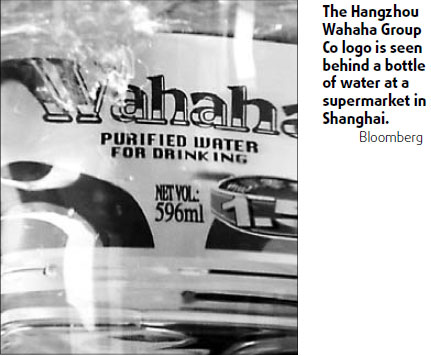National Brands Going Global? It's Inevitable

Editor's note: The stories of Huiyuan in 2008 as well as Wahaha in 2007 clearly reflect the important role performed by a brand in the current global economy. Is national economic safety threatened by international acquisition?
Ma Qiang, a partner attorney at law and trademark attorney at Unitalen, one of China's largest IP law firms with 450 attorneys around the country, provides some suggestions in this article. China Business Weekly will run the article in several issues. Below is the second part. In the first part, Ma said it is not necessary for the government to intervene in a market-oriented business transaction in the beverage industry. The views expressed here are his own.
In the view of the author, the autonomy-of-will doctrine should be strictly followed in reviewing this case because it is the real intention of the Wahaha Group to invest the Wahaha brand value in exchange for Danone's capital, which was necessarily needed for developing the business when the joint venture was formed in 1996.
Although the Trademark Office refused the assignment request made by Hangzhou Wahaha, this administrative decision in itself should not constitute the legal basis for exempting Wahaha Group from its relevant obligations under the agreements. In other words, Wahaha Group should perform its contractual obligation to assign the Wahaha brand and may not take it for granted that the far-fetched excuse that Wahaha as a national brand should not be owned by a foreign company will be supported from the legal perspective by taking into account the safety of the Chinese economy.
Why could brand owners sell their trademarks and businesses of their own will?
Although trademark is known as a tool bridging a business and the target consumers of the products or services the business provides, it is in nature a private property exclusively owned by the proprietor(s). Mr. Zhu Xinli, when defending his decision on selling the Huiyuan business, cited the opinion of the Hong Kong legend and business leader Li Ka-shing that it would be advisable for an entrepreneur to contemplate how to sell a business and obtain profits even prior to the establishment of such business.
This assertion in essence penetrates the inherent nature of capital - chasing after revenues. Although Mr. Zhu excused himself for his future dedication to the upper chain of the juice beverage industry, namely, nurturing fruits which will be supplied to the end manufacturers like Coca-Cola and other juice beverage companies, the "divorce" between him and his famous Huiyuan brand remains controversial.
By surrendering the Huiyuan business and brand, Zhu will obtain a large amount of HK$17.9 billion, with which he could develop his new business and life. Zhu's choice for disposing his own property should be understood and respected. On the other hand, Coca-Cola enjoys the legitimate rights to the Huiyuan brand according to the contract, which should also be duly protected in China.
As efficient competition tools for promoting business in the market, such famous trademarks as Huiyuan or Wahaha mean lifelines for a long-term sustainable business-consumer relationship. Whether the transfer of the brand asset will have an adverse impact on said relationship and the normal business as well is noteworthy. Famous classical acquisition cases in the United States and other developed countries reveal that as long as the subsequent business strategy is appropriate, the brand will still function well to boost the business.
Even for those Chinese companies acquiring foreign brands there are apparently quite a few successful stories. The offer for acquiring the computer section of IBM by Lenovo in 2004, although having incurred objections from consumers and concerns regarding national security, finally proved to be a farsighted business solution for both parties. Notwithstanding the objecting voices against the Huiyuan acquisition, it is believed that the governmental authority will find the rightful basis of this acquisition and approve the same unless some other grounds for objection exists.
In short, notwithstanding the subtle "national" brand complex on the part of some Chinese consumers, one should clearly sense the true nature as reflected in Zhu Xinli's assertion, the overtone of which is indeed a property claim on the Huiyuan business.
The author firmly believes it is a natural, continuous process for a national brand to become a global one and it is just a common business mode for a local business to introduce an existing industry leader like Coca-Cola as an investor. In this flat global village, a national brand is also a global one.
Certainly it is important to encourage and guide Chinese companies to nourish their brands so as to seek long-term interests, but final decisions should still be made by the businesses. From a strict commercial perspective, we have to acknowledge that it is a success if a local company develops itself so successfully and therefore become the target of a foreign investor who is a leader in the same industry in the global market.
There is no need to concern ourselves with the fate of a so-called "national" brand because it will not affect our general economic system. Just as promised by Coca-Cola, the Huiyuan brand will still remain active in the Chinese marketplace.
Globalization of national brands such as Huiyuan and Wahaha is just a common market phenomenon in this sophisticated world economy, even with the possible damage to the image of these brands in the eyes of the Chinese public. It is time to abandon the outdated ultranationalism and to adopt a more objective and open-minded approach instead to the globalization of national brands.
Editor's note: The IPR Special is sponsored by the State Intellectual Property Office and published by China Business Weekly. To contact the Intellectual Property Office, the IPR Special hotlines are 8610-64995422 or 8610-64995826, and the e-mail address is ipr@chinadaily.com.cn.
(China Daily 03/16/2009 page11)
2013-07-17 Print
Print